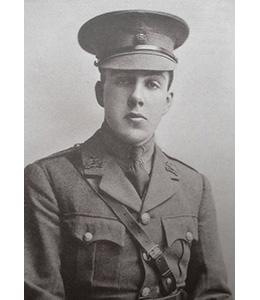Died of wounds received in action aged 22
Buried D 652 Sarigol Military Cemetery, Kriston
Richard Albert Beresford was born in Kent in 1895, elder son of E. Beresford Chancellor MA, FRHS, estate and land agent, and the author of many books on London squares and palaces, and his wife Ellen. His grandfather, Albert, founded Chancellors Land Agents which was sold on his death in 1911, but still (in 1910) retains the Chancellor name.
Richard was educated at Harrow, in due course a Monitor and Head of his House. He won the Shakespeare Medal and the Bourchier History Prize. The late G. Townsend Warner dedicated his book, "The Writing of English," to him. He made his name as a slow left-hand bowler of uncertain length. In 1914, in the Harrow Eleven against Eton, he scored 0 and 1 not out, and took three wickets for 34 runs. During the season he obtained six wickets for Harrow at a cost of 25.67 runs each, and made 16 runs with an average of 2.66. Wisden
Captain Chancellor, instead of going into residence at Oxford, obtained a Commission in the Royal Berkshire Regiment on the outbreak of the War. Three months later he became Lieutenant, and Captain in March, 1916. He went to France with his Regiment in September 1915, where they were in reserve, but not called on, at Loos, and in the following December he moved with the Regiment to Salonika.
He died on 24 December 1916, from the effects of shell wounds, received while leading his men in a raid on the enemy trenches the previous evening. Caring only for the conduct of the raid, he insisted that the wounded men of his company should be carried back first, and remained "joking and cheering on his men, with absolute disregard for himself." Had he lived he would have been recommended for the DSO.
His Colonel wrote: —
"I cannot speak too highly of him. He was absolutely fearless, always cool and collected in any emergency, and never by any chance lost his head. He was a most valuable Officer; his death is a great shock to me, and he is an enormous loss to the Regiment."
Captain Rogers, of the Royal Berkshire Regiment, wrote : —
"He was such a splendid character, and never have I known a man with a nicer mind. He was essentially a man in the best sense, yet with all the intuition and sympathy of a woman."
Captain Pike, of the Royal Berkshire Regiment, wrote : —
"The few remaining old hands amongst us still talk from time to time about Dick. The sense of our loss has not by any means diminished as the days pass. I find it terribly hard to carry on without him. And if any proof were needed that he did not die in vain, it would be afforded by noticing the influence he still has in the Battalion."
Another brother-officer wrote : —
"I have never met such a well-informed fellow, nor one so well read and interesting, and yet he was so utterly unaffected and modest."
He is remembered on the Harrow School Memorial
23rd December 1916
On the 23rd a raid was made on Hill 380, the next spur eastwards of the Mamelon in the enemy line, by Captain R. A. B. Chancellor with D Company, whilst a feint was made by Second-Lieutenant Eastwood with thirty other ranks and two Lewis guns to divert attention from the main body. Captain Chancellor’s party assembled at Green Ravine, at 18:38. The first wave of attack, under Lieutenant Hayter, advanced as far as the N.E. edge of Green Ravine, but was unable at first to go farther, owing to “shorts” from the British barrage. When the barrage lifted, this wave advanced to the enemy trench which was found practically destroyed and most of its wire blown away.
The second wave, under Second-Lieutenant Thompson, then attempted to go forward beyond the trench, but suffered so severely from the fire it encountered that it had to retire. Captain Chancellor had been wounded early in the attack. He continued to lead his men till he was again wounded, this time mortally, when command was taken by Lieutenant Troup; who now retired after the dead and wounded had been evacuated. Before doing so an R.E. detachment laid demolition charges in the enemy’s dugouts, and a Bangalore torpedo in the uncut portion of his wire. A reserve of two platoons, which had been left in Green Ravine, was not called up into action.
His conduct in this affair gained the Military Cross for Second-Lieutenant H. B. Thompson.
The casualties were: Capt. R. A. B. Chancellor, died of his wounds, 2nd-Lieuts. Hayter and Thompson wounded, and of other ranks 5 killed and 29 wounded or missing.
Reading Mercury 19th May 1917
Towards the end of December, the Berkshires suffered the loss of another promising officer in Capt R A B Chancellor, the elder son of Mr & Mrs Beresford Chancellor of Wargrave. The raid was preceded by a four-day bombardment and in the course of the enemy’s retaliation Lt P H Williams, ward of Mr H T Pugh, the Reading education secretary was on December 22nd severely wounded in the right thigh and left foot, one of his toes having to be removed. The enemy had been shelling with some 5.9s and broke all the telephone wires.
As signal Lieut Williams was out with his men repairing the wires when a shell came knocking him over and causing the injuries described. The raid which was carried out by D Company was on Hill 380 and was led by Capt Chancellor. He was hit on the way out, but refused to be brought in and continued to lead his men when he was again wounded, this time mortally.


